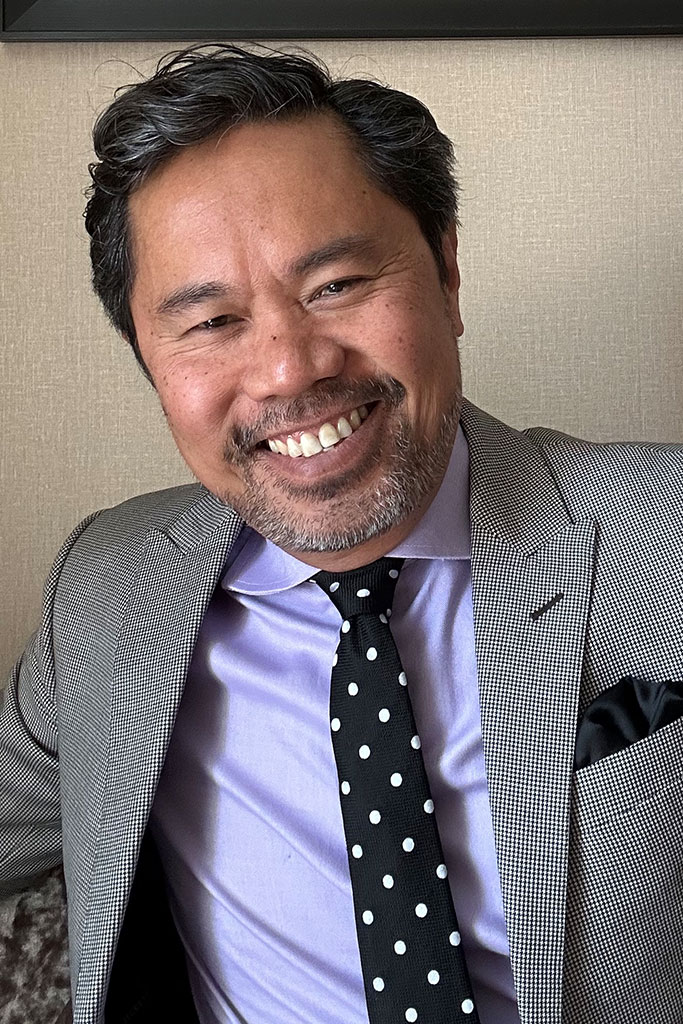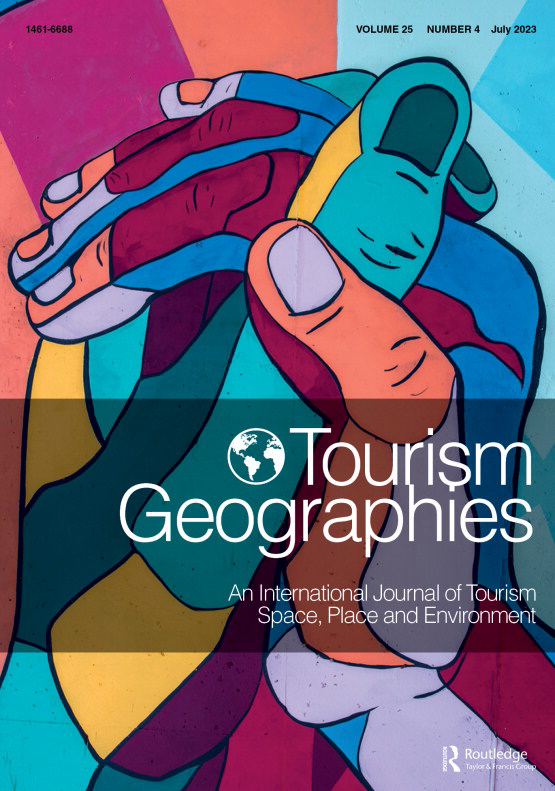Meet the Co-Editor-in-Chief: Prof. Joseph Cheer
Professor Joseph M. Cheer is an international leader in sustainable tourism and heritage, working closely with communities, policymakers, and global organisations to shape a more responsible tourism future. Based at Western Sydney University, he collaborates with partners across Asia, Africa, and the Pacific and is widely recognised for his research, leadership, and contributions to global platforms like the World Economic Forum, UNESCO, and the Asian Development Bank.
As Co-Editor-in-Chief of Tourism Geographies, Prof. Cheer shares more on his role and the industry’s insights, reflecting on his vision for advancing meaningful and accessible tourism research. He also discusses the need for scholarship that informs real-world change and highlights the importance of elevating diverse perspectives from around the world. Read more below on Prof. Cheer’s views on emerging trends in tourism and his advice for researchers aiming to make an impact.

You bring distinct yet complementary lenses to tourism research. How have these perspectives shaped your editorial vision for Tourism Geographies?
I came to Tourism Geographies from a diverse background in industry and government before entering academia. As a practitioner, I worked for international companies in roles across business operations, human resources management, and marketing. I also gained experience in other sectors beyond tourism, including finance and management consulting.
I served at the Australian Government’s Department of Foreign Affairs and Trade, focusing on building the capacity of Pacific Island countries to use tourism as a vehicle for international development. My academic training – degrees in business geography and anthropology; reflects the transdisciplinary lens I apply to my work.
I’ve held various leadership roles, including Co-Chair of the World Economic Forum’s Global Future Council on the Future of Sustainable Tourism, Board Member of the Pacific Asia Travel Association (PATA), and Advisory Board Member for the UN Tourism Best Villages initiative. In these roles, the importance of research in shaping government policy, guiding industry practice, and building community awareness has been a clear and constant reminder.
I continue to consult actively with the Asian Development Bank and UN Tourism, among others.
As a result, I’m acutely conscious about how the research published must have real-world impact, transcending publishing for publishing’s sake. That’s not to downplay the value of theoretical development within the subfield; theory is essential for helping us understand phenomena and shaping how we think about key issues.
These perspectives inform the types of papers we publish and highlight broader concerns about research impact. From a purely academic, metrics-driven perspective, if peers aren’t engaging with the work published and it is not being cited, this raises questions about its value.
One ongoing challenge I face as editor is increasing representation from beyond the Euro- and Anglosphere. This is particularly pressing as many researchers in the Global South lack access to a broad range of scholarly publications. This can result in papers that seem out of step with relevant literature. Moreover, since most academic publishing is in English, many scholars are writing in their second, third, or even fourth language.
My editorial vision for the journal includes encouraging authors to submit work that is meticulously prepared and shaped to make timely, critical contributions to knowledge gaps. However, in this environment, it’s easy for authors to get caught up in “playing the game”- prioritizing quantity over quality.
I also place a strong emphasis on methodological rigor, clarity in research questions, and writing that is engaging and accessible, even to those less academically inclined.
I don’t see myself as a gatekeeper, but rather someone responsible for helping shape and facilitate the development of important research. The editor role is vital because we are the role models and guardians of the sub-discipline. If we’re not doing this work thoughtfully and diligently, it’s a disservice to the academic community.
I also care deeply about how research is shared with the audiences who need it most. Social media plays a vital role in dissemination, but many researchers either avoid it or don’t know how to use it effectively. I can’t emphasise enough how important the development of a social media profile is for researchers.
Lastly, once the paper is published, it’s on the public record and stands as a testament to the researcher’s work, and the editor’s diligence in bringing this to publication. Therefore, in my practice as a journal editor, I cannot place enough emphasis on the importance of thorough and meticulous review – so that every publication reflects well on both the author and the journal.

As someone deeply engaged in sustainable tourism and its practical applications – from academic leadership to global council roles, have you found any insights within Taylor & Francis journals that have particularly resonated with the evolving challenges and trends in your field?
I am always interested in how other journals are developing; what they’re publishing, how they’re engaging their audiences, and how they’re positioning themselves. Taylor & Francis, as one of the more established publishers in academia, has systems and processes long-established and proven. As an editor, this helps ensure that the path from submission to publication is seamless and focused on maintaining quality.
I am an avid reader of articles published in peer journals in the tourism sub-discipline including the Journal of Sustainable Tourism, Journal of Heritage Tourism, Current Issues in Tourism, and Tourism Planning and Development. These journals often reflect the shifting conversations around sustainability, heritage, and policy, topics central to my own work.
You’ve recently co-edited major volumes such as Recentering Tourism Geographies in the Asian Century and Global Tourism and COVID-19: Implications for Theory and Practice. What did those projects mean to you personally and professionally, and how did the publishing process support your goals?
As someone based in the Asia-Pacific, and having spent significant time in Japan and China, Recentering Tourism Geographies in the Asian Century was important in emphasising how the pivot from West to East is taking place, and for an industry like tourism, the Asia-Pacific region is rapidly becoming especially influential on global travel flows. This special issue allowed us to spotlight how global power dynamics in tourism are shifting from West to East, and how countries like China and India are emerging as major influencers in global travel and tourism flows.
Similarly, with Global Tourism and COVID-19: Implications for Theory and Practice, we had an opportunity to reflect on how a global shock like the pandemic forces the field to confront urgent theoretical and practical questions. The volume provided space for senior and emerging scholars engage with debates on how to best contribute to more substantial, meaningful, and positive planetary shifts within the tourism industry – something very necessary in a post COVID-19 era.
Having contributed to academic publishing as editors, authors, and reviewers, how has your experience with Taylor & Francis helped support your research goals and connect your work with broader audiences?
Editing a journal in partnership with a publisher like Taylor & Francis brings significant advantages, particularly in terms of global reach and operational efficiency. Their well-established journal administration systems streamline many aspects of the editorial process, allowing editors to focus more fully on content and quality.
Global accessibility is critical. Publishing on a platform that prioritizes discoverability increases the chances that research will reach the right hands and inform decisions beyond academia.
Tourism Geographies focuses on tourism from a geographical perspective, and brings together critical, multidisciplinary work across the social sciences. How do you see the journal contributing to conversations around today’s urgent global challenges, and what advice would you offer to early-career researchers who hope to publish meaningful, rigorous work within this field?
For the research in Tourism Geographies to make a substantive impact on policy and practice, it is vital that, as journal editors, we insist on authors being able to engage with material that heightens the value of the research beyond academia.
It’s encouraging to see that more of the work we publish is being picked up by media outlets and policy communities. That kind of engagement signals that the research is making a difference – it’s being read, discussed, and acted on beyond academia.
For early career researchers, the key is being able to disseminate their research to a wide audience beyond your academic peers. This means becoming more adept at writing for non-academic publications like newspapers, magazines or blogs, or maintaining a social media presence.
Also, where academic careers can be quite precarious, it’s increasingly important to translate scholarly knowledge into practical solutions for governments, industry, and communities. Doing so requires an enterprising and creative mindset.


Discover more from one of the authors of Tourism Geographies
In this insightful Q&A, we dive in deeper about Dr Donna James’ article Precarious labour geographies of working holiday makers: querying sustainability where she investigates the exploitation faced by Working Holiday Makers in Australia, revealing how visa-linked work conditions create systemic vulnerabilities. Framed through the lens of mobility justice, her research calls for urgent policy reform.
About the Journal
Tourism Geographies is the flagship social science journal focused on tourism from a geographic perspective. The journal publishes critical, multidisciplinary work from social science fields such as geography, anthropology, sociology, area studies, urban and regional planning, environmental studies, and geospatial sciences. Tourism Geographies is committed to publishing manuscripts based on rich empirical and theoretically rigorous scholarship that engages with and advances tourism geographies knowledge.


